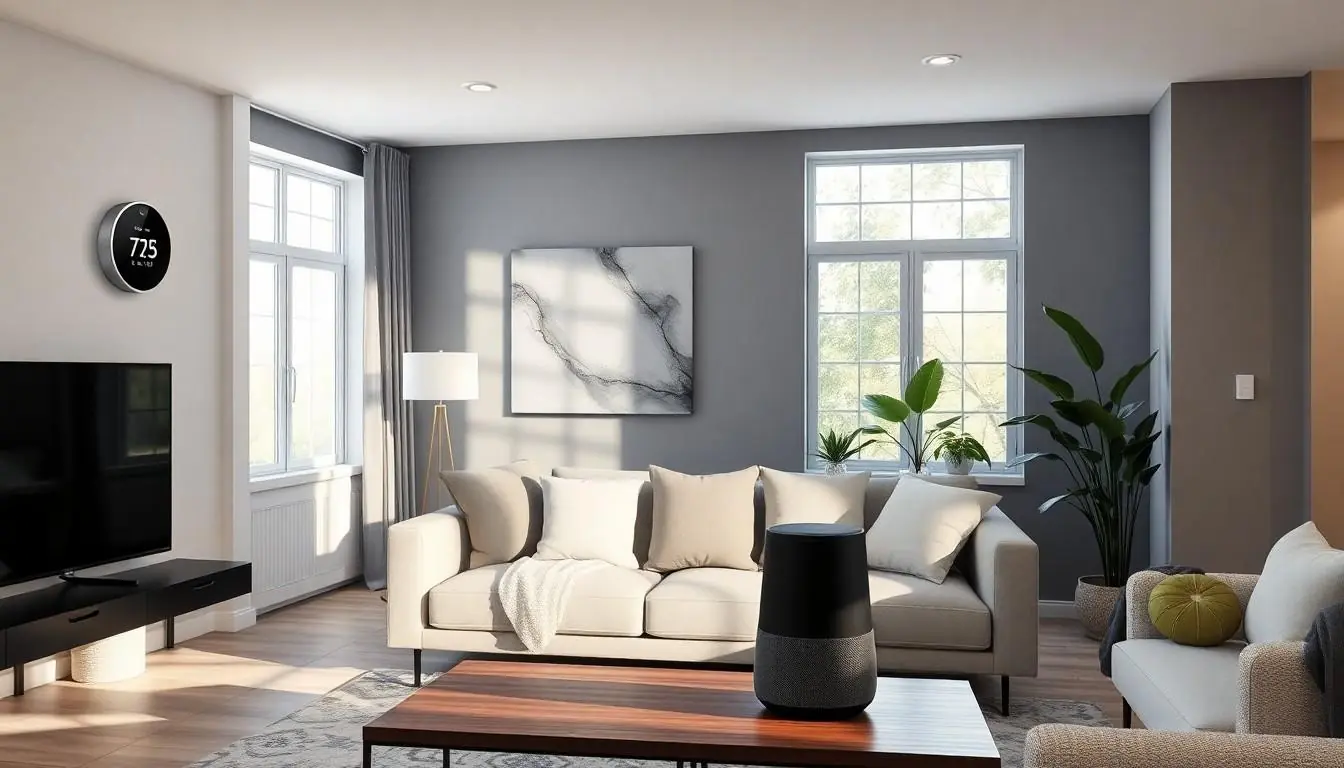In a world where your coffee maker can brew your morning cup with just a voice command, the role of a smart home technician has never been more vital. These tech-savvy wizards are the unsung heroes behind the curtain, ensuring your home is not just smart but downright genius. Imagine a life where your thermostat knows when you’re cold and your lights dim just in time for movie night—sounds dreamy, right?
But let’s face it: navigating the maze of smart devices can feel like decoding an alien language. That’s where the smart home technician swoops in, armed with tools and a dash of humor. They transform chaos into convenience, making your home a sanctuary of comfort and efficiency. So, if you’re ready to elevate your living space, it’s time to discover the magic of having a smart home technician on your side.
Table of Contents
ToggleOverview of Smart Home Technicians
Smart home technicians play a crucial role in optimizing technology for residential spaces. They specialize in integrating smart devices, offering solutions that enhance convenience and efficiency.
Role and Responsibilities
Smart home technicians evaluate client needs and assess existing systems. They install smart devices like lighting, security, and climate control using technical expertise. Additionally, they ensure compatibility among various systems to create seamless connectivity. Technicians also provide maintenance and troubleshooting services to resolve issues as they arise. By educating clients on device functionality, they empower homeowners to fully leverage smart technology.
Essential Skills and Qualifications
Technicians possess a strong foundation in electronics and computer systems. Familiarity with various smart home products, including security cameras and smart speakers, is vital. Problem-solving skills allow them to address technical challenges effectively. Communication ability enhances interactions with clients, emphasizing the importance of customer service. Relevant certifications in smart technology or home automation systems often distinguish skilled technicians in the field.
Importance of Smart Home Technology

Smart home technology brings transformative advantages to modern living. Homeowners enjoy enhanced convenience, security, and efficiency.
Benefits for Homeowners
Smart home technology streamlines daily activities. Tasks like adjusting lighting or controlling thermostats happen at a touch or through voice commands. Increased security also comes with smart locks and cameras that monitor premises in real-time. Homeowners appreciate the ability to customize their environment according to personal preferences. Moreover, accessibility features benefit those with mobility challenges, ensuring everyone can enjoy a comfortable living space. They enable remote monitoring and management, giving peace of mind during travel or extended absences.
Impact on Energy Efficiency
Energy efficiency improves with smart home systems. Programmable thermostats automatically adjust heating and cooling schedules, reducing energy consumption. Advanced lighting systems use motion sensors to turn off lights when they’re not needed. Incorporating smart appliances leads to lower utility bills through optimized performance. It’s possible to track energy usage in real-time, which encourages mindful consumption. This proactive approach not only conserves resources but also supports environmental sustainability efforts. Over time, these savings contribute to significant financial benefits for homeowners.
Career Path for Smart Home Technicians
Smart home technicians follow a defined career path that combines education, training, and practical experience to excel in the field. This pathway enables them to meet the evolving demands of smart technology integration.
Education and Training Requirements
Formal education typically begins with a high school diploma or equivalent. Many technicians pursue an associate degree in electronics, information technology, or a related field to establish a solid foundation. Hands-on training through internships or apprenticeships often supplements classroom learning. Specialized coursework in smart home technologies covers areas like network configuration, device compatibility, and system installation.
Certifications and Licensing
Procuring relevant certifications enhances a technician’s credibility in the industry. Organizations such as the Electronics Technicians Association offer certifications in smart home installation and maintenance. Certifications from manufacturers like Google, Amazon, or Apple also provide valuable recognition. In some states, licensing may be required for specific installations, particularly concerning electrical or security systems. Adhering to local regulations ensures compliance while promoting safety standards.
Tools and Technologies Used
Smart home technicians utilize a variety of tools and technologies to enhance residential environments. These instruments ensure effective installation, integration, and maintenance of smart systems.
Common Equipment and Software
Technicians commonly rely on specific equipment and software to execute their tasks. Multimeters help measure electrical properties during installation. Device configuration tools assist in setting up networks and ensuring device compatibility. Many technicians also use a range of software applications for installation simulation and troubleshooting, such as SmartThings and Google Home. These applications allow for easy management and control of various smart devices. Furthermore, documentation tools aid in maintaining records and assisting clients with product education.
Emerging Trends in Smart Home Technology
Innovations drive the landscape of smart home technology, showcasing exciting advancements. Voice control interfaces continue gaining popularity, enabling hands-free operation of devices. Artificial intelligence plays a key role in enhancing device responsiveness and personalization. Enhanced security features, such as facial recognition and real-time alerts, have emerged as essential elements of modern smart systems. During installations, technicians increasingly integrate eco-friendly solutions, aligning with growing sustainability goals. These trends reflect a dynamic future in smart home technology, presenting technicians with new opportunities to improve user experiences.
Challenges in the Industry
Smart home technicians encounter several challenges while integrating advanced systems in residential settings. Issues such as device compatibility, connectivity problems, and varying user needs complicate their work.
Common Issues Faced by Technicians
Technicians often face compatibility issues across different smart devices. Devices from multiple manufacturers might not communicate effectively, leading to frustration. Connectivity problems arise frequently, especially with wireless networks that may not support numerous devices simultaneously. User experience varies greatly, as clients often express diverse expectations regarding functionality and ease of use. Technicians also struggle with rapidly evolving technologies, making it difficult to stay updated on the latest advancements.
Solutions and Best Practices
Adopting a proactive approach helps technicians address common issues efficiently. Regular training sessions ensure that technicians stay informed about new technologies and compatibility standards. Establishing clear communication with clients lays the foundation for understanding their needs and setting realistic expectations. Using standardized platforms can simplify integration across various devices, reducing compatibility issues. Technicians benefit from maintaining a robust toolkit, equipped with troubleshooting devices to address connectivity problems quickly.
Smart home technicians play a pivotal role in the modern residential landscape. Their expertise not only simplifies the integration of advanced technologies but also enhances everyday living through automation and improved security. As the demand for smart home solutions continues to rise, these professionals are essential in guiding homeowners through the complexities of smart devices.
By staying informed about the latest trends and technologies, smart home technicians can ensure that their clients enjoy the full benefits of a connected home. Their commitment to quality service and ongoing education positions them as invaluable resources in the evolving world of smart technology. Embracing this career path not only offers personal fulfillment but also contributes to a more efficient and sustainable future for all.


